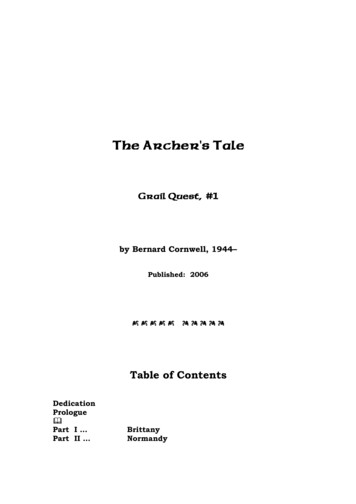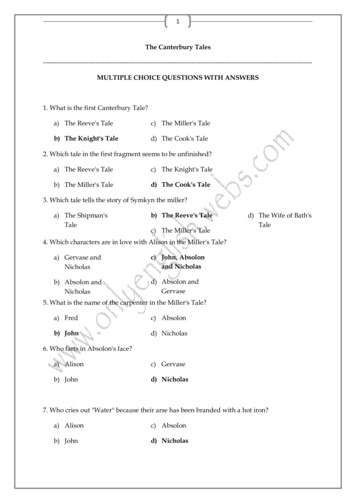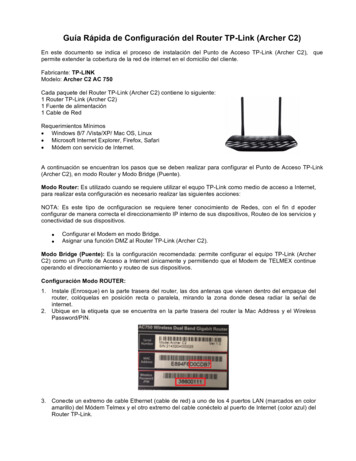
Transcription
The Archer's TaleGrail Quest, #1by Bernard Cornwell, 1944–Published: 2006JJJJJIIIIITable of ContentsDedicationProloguePart I Part II BrittanyNormandy
Part III CrécyHistorical Note*****This book is a work of fiction. The characters, incidents, and dialogue are drawn from the author’simagination and are not to be construed as real. Any resemblance to actual events or persons,living or dead, is entirely coincidental.JJJJJIIIIIThe Archer’s Taleis for Richard and JulieRutherford-Moore“ many deadly battles have been fought, people slaughtered, churchesrobbed, souls destroyed, young women and virgins deflowered, respectablewives and widows dishonored; towns, manors and buildings burned, androbberies, cruelties and ambushes committed on the highways. Justice hasfailed because of these things. The Christian faith has withered andcommerce has perished and so many other wickednesses and horrid thingshave followed from these wars that they cannot be spoken, numbered orwritten down.”—JEAN II, KING OF FRANCE, 1360PrologueTHE TREASURE OF HOOKTON was stolen on Easter morning 1342.It was a holy thing, a relic that hung from the church rafters, and it wasextraordinary that so precious an object should have been kept in such anobscure village. Some folk said it had no business being there, that it should havebeen enshrined in a cathedral or some great abbey, while others, many others,said it was not genuine. Only fools denied that relics were faked. Glib men roamedthe byways of England selling yellowed bones that were said to be from the fingersor toes or ribs of the blessed saints, and sometimes the bones were human,though more often they were from pigs or even deer, but still folk bought and
prayed to the bones. “A man might as well pray to St. Guinefort,” Father Ralphsaid, then snorted with mocking laughter. “They’re praying to ham bones, hambones! The blessed pig!”It had been Father Ralph who had brought the treasure to Hookton and hewould not hear of it being taken away to a cathedral or abbey, and so for eightyears it hung in the small church, gathering dust and growing spider webs thatshone silver when the sunlight slanted through the high window of the westerntower. Sparrows perched on the treasure and some mornings there were batshanging from its shaft. It was rarely cleaned and hardly ever brought down,though once in a while Father Ralph would demand that ladders be fetched andthe treasure unhooked from its chains and he would pray over it and stroke it. Henever boasted of it. Other churches or monasteries, possessing such a prize,would have used it to attract pilgrims, but Father Ralph turned visitors away. “It isnothing,” he would say if a stranger enquired after the relic, “a bauble. Nothing.”He became angry if the visitors persisted. “It is nothing, nothing, nothing!” FatherRalph was a frightening man even when he was not angry, but in his temper hewas a wild-haired fiend, and his flaring anger protected the treasure, thoughFather Ralph himself believed that ignorance was its best protection for if men didnot know of it then God would guard it. And so He did, for a time.Hookton’s obscurity was the treasure’s best protection. The tiny village lay onEngland’s south coast where the Lipp, a stream that was almost a river, flowed tothe sea across a shingle beach. A half-dozen fishing boats worked from the village,protected at night by the Hook itself, which was a tongue of shingle that curvedaround the Lipp’s last reach, though in the famous storm of 1322 the sea hadroared across the Hook and pounded the boats to splinters on the upper beach.The village had never really recovered from that tragedy. Nineteen boats had sailedfrom the Hook before the storm, but twenty years later only six small craft workedthe waves beyond the Lipp’s treacherous bar. The rest of the villagers worked inthe saltpans, or else herded sheep and cattle on the hills behind the huddle ofthatched huts which clustered about the small stone church where the treasurehung from the blackened beams. That was Hookton, a place of boats, fish, saltand livestock, with green hills behind, ignorance within and the wide sea beyond.Hookton, like every place in Christendom, held a vigil on the eve of Easter, andin 1342 that solemn duty was performed by five men who watched as FatherRalph consecrated the Easter Sacraments and then laid the bread and wine on thewhite-draped altar. The wafers were in a simple clay bowl covered with a piece ofbleached linen, while the wine was in a silver cup that belonged to Father Ralph.The silver cup was a part of his mystery. He was very tall, pious and much toolearned to be a village priest. It was rumored that he could have been a bishop,but that the devil had persecuted him with bad dreams and it was certain that inthe years before he came to Hookton he had been locked in a monastery’s cellbecause he was possessed by demons. Then, in 1334, the demons had left himand he was sent to Hookton where he terrified the villagers by preaching to thegulls, or pacing the beach weeping for his sins and striking his breast with sharpedged stones. He howled like a dog when his wickedness weighed too heavily onhis conscience, but he also found a kind of peace in the remote village. He built alarge house of timber, which he shared with his housekeeper, and he made friends
with Sir Giles Marriott, who was the lord of Hookton and lived in a stone hall threemiles to the north.Sir Giles, of course, was a gentleman, and so it seemed was Father Ralph,despite his wild hair and angry voice. He collected books which, after the treasurehe had brought to the church, were the greatest marvels in Hookton. Sometimes,when he left his door open, people would just gape at the seventeen books thatwere bound in leather and piled on a table. Most were in Latin, but a handful werein French, which was Father Ralph’s native tongue. Not the French of France, butNorman French, the language of England’s rulers, and the villagers reckoned theirpriest must be nobly born, though none dared ask him to his face. They were alltoo scared of him, but he did his duty by them; he christened them, churchedthem, married them, heard their confessions, absolved them, scolded them andburied them, but he did not pass the time with them. He walked alone, grim-faced,hair awry and eyes glowering, but the villagers were still proud of him. Mostcountry churches suffered ignorant, pudding-faced priests who were scarce moreeducated than their parishioners, but Hookton, in Father Ralph, had a properscholar, too clever to be sociable, perhaps a saint, maybe of noble birth, a selfconfessed sinner, probably mad, but undeniably a real priest.Father Ralph blessed the Sacraments, then warned the five men that Luciferwas abroad on the night before Easter and that the devil wanted nothing so muchas to snatch the Holy Sacraments from the altar and so the five men must guardthe bread and wine diligently and, for a short time after the priest had left, theydutifully stayed on their knees, gazing at the chalice, which had an armorial badgeengraved in its silver flank. The badge showed a mythical beast, a yale, holding agrail, and it was that noble device which suggested to the villagers that FatherRalph was indeed a high-born man who had fallen low through being possessed ofdevils. The silver chalice seemed to shimmer in the light of two immensely tallcandles which would burn through the whole long night. Most villages could notafford proper Easter candles, but Father Ralph purchased two from the monks atShaftesbury every year and the villagers would sidle into the church to stare atthem. But that night, after dark, only the five men saw the tall unwavering flames.Then John, a fisherman, farted. “Reckon that’s ripe enough to keep the old devilaway,” he said, and the other four laughed. Then they all abandoned the chancelsteps and sat with their backs against the nave wall. John’s wife had provided abasket of bread, cheese and smoked fish, while Edward, who owned a saltworkson the beach, had brought ale.In the bigger churches of Christendom knights kept this annual vigil. They kneltin full armor, their surcoats embroidered with prancing lions and stooping hawksand axe heads and spread-wing eagles, and their helmets mounted with featheredcrests, but there were no knights in Hookton and only the youngest man, who wascalled Thomas and who sat slightly apart from the other four, had a weapon. Itwas an ancient, blunt and slightly rusted sword.“You reckon that old blade will scare the devil, Thomas?” John asked him.“My father said I had to bring it,” Thomas said.“What does your father want with a sword?”“He throws nothing away, you know that,” Thomas said, hefting the old weapon.It was heavy, but he lifted it easily; at eighteen, he was tall and immensely strong.
He was well liked in Hookton for, despite being the son of the village’s richest man,he was a hard-working boy. He loved nothing better than a day at sea haulingtarred nets that left his hands raw and bleeding. He knew how to sail a boat, hadthe strength to pull a good oar when the wind failed; he could lay snares, shoot abow, dig a grave, geld a calf, lay thatch or cut hay all day long. He was a big, bony,black-haired country boy, but God had given him a father who wanted Thomas torise above common things. He wanted the boy to be a priest, which was whyThomas had just finished his first term at Oxford.“What do you do at Oxford, Thomas?” Edward asked him.“Everything I shouldn’t,” Thomas said. He pushed black hair away from his facethat was bony like his father’s. He had very blue eyes, a long jaw, slightly hoodedeyes and a swift smile. The girls in the village reckoned him handsome.“Do they have girls at Oxford?” John asked slyly.“More than enough,” Thomas said.“Don’t tell your father that,” Edward said, “or he’ll be whipping you again. Agood man with a whip, your father.”“There’s none better,” Thomas agreed.“He only wants the best for you,” John said. “Can’t blame a man for that.”Thomas did blame his father. He had always blamed his father. He had foughthis father for years, and nothing so raised the anger between them as Thomas’sobsession with bows. His mother’s father had been a bowyer in the Weald, andThomas had lived with his grandfather until he was nearly ten. Then his fatherhad brought him to Hookton, where he had met Sir Giles Marriott’s huntsman,another man skilled in archery, and the huntsman had become his new tutor.Thomas had made his first bow at eleven, but when his father found the elmwoodweapon he had broken it across his knee and used the remnants to thrash hisson. “You are not a common man,” his father had shouted, beating the splinteredstaves on Thomas’s back and head and legs, but neither the words nor thethrashing did any good. And as Thomas’s father was usually preoccupied withother things, Thomas had plenty of time to pursue his obsession.By fifteen he was as good a bowyer as his grandfather, knowing instinctivelyhow to shape a stave of yew so that the inner belly came from the dense heartwoodwhile the front was made of the springier sapwood, and when the bow was bentthe heartwood was always trying to return to the straight and the sapwood wasthe muscle that made it possible. To Thomas’s quick mind there was somethingelegant, simple and beautiful about a good bow. Smooth and strong, a good bowwas like a girl’s flat belly, and that night, keeping the Easter vigil in Hooktonchurch, Thomas was reminded of Jane, who served in the village’s small alehouse.John, Edward and the other two men had been speaking of village things: theprice of lambs at Dorchester fair, the old fox up on Lipp Hill that had taken awhole flock of geese in one night and the angel who had been seen over therooftops at Lyme.“I reckon they’s been drinking too much,” Edward said.“I sees angels when I drink,” John said.“That be Jane,” Edward said. “Looks like an angel, she does.”“Don’t behave like one,” John said. “Lass is pregnant,” and all four men lookedat Thomas, who stared innocently up at the treasure hanging from the rafters. In
truth Thomas was frightened that the child was indeed his and terrified of whathis father would say when he found out, but he pretended ignorance of Jane’spregnancy that night. He just looked at the treasure that was half obscured by afishing net hung up to dry, while the four older men gradually fell asleep. A colddraught flickered the twin candle flames. A dog howled somewhere in the village,and always, never ending, Thomas could hear the sea’s heartbeat as the wavesthumped on the shingle then scraped back, paused and thumped again. Helistened to the four men snoring and he prayed that his father would never findout about Jane, though that was unlikely for she was pressing Thomas to marryher and he did not know what to do. Maybe, he thought, he should just run away,take Jane and his bow and run, but he felt no certainty and so he just gazed atthe relic in the church roof and prayed to its saint for help.The treasure was a lance. It was a huge thing, with a shaft as thick as a man’sforearm and twice the length of a man’s height and probably made of ash thoughit was so old no one could really say, and age had bent the blackened shaft out oftrue, though not by much, and its tip was not an iron or steel blade, but a wedgeof tarnished silver which tapered to a bodkin’s point. The shaft did not swell toprotect the handgrip, but was smooth like a spear or a goad; indeed the reliclooked very like an oversized ox-goad, but no farmer would ever tip an ox-goadwith silver. This was a weapon, a lance.But it was not any old lance. This was the very lance which St. George had usedto kill the dragon. It was England’s lance, for St. George was England’s saint andthat made it a very great treasure, even if it did hang in Hookton’s spidery churchroof. There were plenty of folk who said it could not have been St. George’s lance,but Thomas believed it was and he liked to imagine the dust churned by thehooves of St. George’s horse, and the dragon’s breath streaming in hellish flame asthe horse reared and the saint drew back the lance. The sunlight, bright as anangel’s wing, would have been flaring about St. George’s helmet, and Thomasimagined the dragon’s roar, the thrash of its scale-hooked tail, the horsescreaming in terror, and he saw the saint stand in his stirrups before plunging thelance’s silver tip down through the monster’s armored hide. Straight to the heartthe lance went, and the dragon’s squeals would have rung to heaven as it writhedand bled and died. Then the dust would have settled and the dragon’s blood wouldhave crusted on the desert sand, and St. George must have hauled the lance freeand somehow it ended up in Father Ralph’s possession. But how? The priestwould not say. But there it hung, a great dark lance, heavy enough to shatter adragon’s scales.So that night Thomas prayed to St. George while Jane, the black-haired beautywhose belly was just rounding with her unborn child, slept in the taproom of thealehouse, and Father Ralph cried aloud in his nightmare for fear of the demonsthat circled in the dark, and the vixens screamed on the hill as the endless wavesclawed and sucked at the shingle on the Hook. It was the night before Easter.Thomas woke to the sound of the village cockerels and saw that the expensivecandles had burned down almost to their pewter holders. A gray light filled thewindow above the white-fronted altar. One day, Father Ralph had promised thevillage, that window would be a blaze of colored glass showing St. Georgeskewering the dragon with the silver-headed lance, but for now the stone frame
was filled with horn panes that turned the air within the church as yellow asurine.Thomas stood, needing to piss, and the first awful screams sounded from thevillage.For Easter had come, Christ was risen and the French were ashore.THE RAIDERS CAME from Normandy in four boats that had sailed thenight’s west wind. Their leader, Sir Guillaume d’Evecque, the Sieur d’Evecque, wasa seasoned warrior who had fought the English in Gascony and Flanders, and hadtwice led raids on England’s southern coast. Both times he had brought his boatssafe home with cargoes of wool, silver, livestock and women. He lived in a finestone house on Caen’s Île St. Jean, where he was known as the knight of the seaand of the land. He was thirty years old, broad in the chest, wind-burned and fairhaired, a cheerful, unreflective man who made his living by piracy at sea andknight-service on shore, and now he had come to Hookton.It was an insignificant place, hardly likely to yield any great reward, but SirGuillaume had been hired for the task and if he failed at Hookton, if he did notsnatch so much as one single poor coin from a villager, he would still make hisprofit for he had been promised one thousand livres for this expedition. Thecontract was signed and sealed, and it promised Sir Guillaume the one thousandlivres together with any other plunder he could find in Hookton. One hundredlivres had already been paid and the rest was in the keeping of Brother Martin inCaen’s Abbaye aux Hommes, and all Sir Guillaume had to do to earn theremaining nine hundred livres was bring his boats to Hookton, take what hewanted, but leave the church’s contents to the man who had offered him such agenerous contract. That man now stood beside Sir Guillaume in the leading boat.He was a young man, not yet thirty, tall and black-haired, who spoke rarely andsmiled less. He wore an expensive coat of mail that fell to his knees and over it asurcoat of deep black linen that bore no badge, though Sir Guillaume guessed theman was nobly born for he had the arrogance of rank and the confidence ofprivilege. He was certainly not a Norman noble, for Sir Guillaume knew all thosemen, and Sir Guillaume doubted the young man came from nearby Alençon orMaine, for he had ridden with those forces often enough, but the sallow cast of thestranger’s skin suggested he came from one of the Mediterranean provinces, fromLanguedoc perhaps, or Dauphine, and they were all mad down there. Mad asdogs. Sir Guillaume did not even know the man’s name.“Some men call me the Harlequin,” the stranger had answered when SirGuillaume had asked.“Harlequin?” Sir Guillaume had repeated the name, then made the sign of thecross for such a name was hardly a boast. “You mean like the hellequin?”“Hellequin in France,” the man had allowed, “but in Italy they say harlequin. Itis all the same.” The man had smiled, and something about that smile hadsuggested Sir Guillaume had best curb his curiosity if he wanted to receive theremaining nine hundred livres.
The man who called himself the Harlequin now stared at the misty shore wherea stumpy church tower, a huddle of vague roofs and a smear of smoke from thesmoldering fires of the saltpans just showed. “Is that Hookton?” he asked.“So he says,” Sir Guillaume answered, jerking his head at the shipmaster.“Then God have mercy on it,” the man said. He drew his sword, even though thefour boats were still a half-mile from shore. The Genoese crossbowmen, hired forthe voyage, made the sign of the cross, then began winding their cords as SirGuillaume ordered his banner raised to the masthead. It was a blue flag decoratedwith three stooping yellow hawks that had outspread wings and claws hookedready to savage their prey. Sir Guillaume could smell the salt fires and hear thecockerels crowing ashore.The cockerels were still crowing as the bows of his four ships ran onto theshingle.Sir Guillaume and the Harlequin were the first ashore, but after them came ascore of Genoese crossbowmen, who were professional soldiers and knew theirbusiness. Their leader took them up the beach and through the village to block thevalley beyond, where they would stop any of the villagers escaping with theirvaluables. Sir Guillaume’s remaining men would ransack the houses while thesailors stayed on the beach to guard their ships.It had been a long, cold and anxious night at sea, but now came the reward.Forty men-at-arms invaded Hookton. They wore close-fitting helmets and had mailshirts over leather-backed hacquetons, they carried swords, axes or spears, andthey were released to plunder. Most were veterans of Sir Guillaume’s other raidsand knew just what to do. Kick in the flimsy doors and start killing the men. Letthe women scream, but kill the men, for it was the men who would fight backhardest. Some women ran, but the Genoese crossbowmen were there to stopthem. Once the men were dead the plundering could begin, and that took time forpeasants everywhere hid whatever was valuable and the hiding places had to beferreted out. Thatch had to be pulled down, wells explored, floors probed, butplenty of things were not hidden. There were hams waiting for the first meal afterLent, racks of smoked or dried fish, piles of nets, good cooking pots, distaffs andspindles, eggs, butter churns, casks of salt — all humble enough things, butsufficiently valuable to take back to Normandy. Some houses yielded small hoardsof coins, and one house, the priest’s, was a treasure-trove of silver plate,candlesticks and jugs. There were even some good bolts of woollen cloth in thepriest’s house, and a great carved bed, and a decent horse in the stable. SirGuillaume looked at the seventeen books, but decided they were worthless and so,having wrenched the bronze locks from the leather covers, he left them to burnwhen the houses were fired.He had to kill the priest’s housekeeper. He regretted that death. Sir Guillaumewas not squeamish about killing women, but their deaths brought no honor andso he discouraged such slaughter unless the woman caused trouble, and thepriest’s housekeeper wanted to fight. She slashed at Sir Guillaume’s men-at-armswith a roasting spit, called them sons of whores and devils’ grubs, and in the endSir Guillaume cut her down with his sword because she would not accept her fate.“Stupid bitch,” Sir Guillaume said, stepping over her body to peer into thehearth. Two fine hams were being smoked in the chimney. “Pull them down,” he
ordered one of his men, then left them to search the house while he went to thechurch.Father Ralph, woken by the screams of his parishioners, had pulled on acassock and run to the church. Sir Guillaume’s men had left him alone out ofrespect, but once inside the little church the priest had begun to hit the invadersuntil the Harlequin arrived and snarled at the men-at-arms to hold the priest.They seized his arms and held him in front of the altar with its white Easterfrontal.The Harlequin, his sword in his hand, bowed to Father Ralph. “My lord Count,”he said.Father Ralph closed his eyes, perhaps in prayer, though it looked more likeexasperation. He opened them and gazed into the Harlequin’s handsome face.“You are my brother’s son,” he said, and did not sound mad at all, merely full ofregret.“True.”“How is your father?”“Dead,” the Harlequin said, “as is his father and yours.”“God rest their souls,” Father Ralph said piously.“And when you are dead, old man, I shall be the Count and our family will riseagain.”Father Ralph half smiled, then just shook his head and looked up at the lance.“It will do you no good,” he said, “for its power is reserved for virtuous men. It willnot work for evil filth like you.” Then Father Ralph gave a curious mewing noise asthe breath rushed from him and he stared down to where his nephew had run thesword into his belly. He struggled to speak, but no words came, then he collapsedas the men-at-arms released him and he slumped by the altar with blood puddlingin his lap.The Harlequin wiped his sword on the wine-stained altar cloth, then orderedone of Sir Guillaume’s men to find a ladder.“A ladder?” the man-at-arms asked in confusion.“They thatch their roofs, don’t they? So they have a ladder. Find it.” TheHarlequin sheathed his sword, then stared up at the lance of St. George.“I have put a curse on it.” Father Ralph spoke faintly. He was pale-faced, dying,but sounded oddly calm.“Your curse, my lord, worries me as much as a tavern maid’s fart.” TheHarlequin tossed the pewter candlesticks to a man-at-arms, then scooped thewafers from the clay bowl and crammed them into his mouth. He picked up thebowl, peered at its darkened surface and reckoned it was a thing of no value so leftit on the altar. “Where’s the wine?” he asked Father Ralph.Father Ralph shook his head. “Calix meus inebrians,” he said, and theHarlequin just laughed. Father Ralph closed his eyes as the pain gripped his belly.“Oh God,” he moaned.The Harlequin crouched by his uncle’s side. “Does it hurt?”“Like fire,” Father Ralph said.“You will burn in hell, my lord,” the Harlequin said, and he saw how FatherRalph was clutching his wounded belly to staunch the flow of blood and so hepulled the priest’s hands away and then, standing, kicked him hard in the
stomach. Father Ralph gasped with pain and curled his body. “A gift from yourfamily,” the Harlequin said, then turned away as a ladder was brought into thechurch.The village was filled with screams, for most of the women and children werestill alive and their ordeal had scarcely begun. All the younger women were brisklyraped by Sir Guillaume’s men and the prettiest of them, including Jane from thealehouse, were taken to the boats so they could be carried back to Normandy tobecome the whores or wives of Sir Guillaume’s soldiers. One of the womenscreamed because her baby was still in her house, but the soldiers did notunderstand her and they struck her to silence then pushed her into the hands ofthe sailors, who lay her on the shingle and lifted her skirts. She wept inconsolablyas her house burned. Geese, pigs, goats, six cows and the priest’s good horse wereherded toward the boats while the white gulls rode the sky, crying.The sun had scarcely risen above the eastern hills and the village had alreadyyielded more than Sir Guillaume had dared hope for.“We could go inland,” the captain of his Genoese crossbowmen suggested.“We have what we came for,” the black-dressed Harlequin intervened. He hadplaced the unwieldy lance of St. George on the graveyard grass, and now stared atthe ancient weapon as though he was trying to understand its power.“What is it?” the Genoese crossbowman asked.“Nothing that is of use to you.”Sir Guillaume grinned. “Strike a blow with that,” he said, “and it’ll shatter likeivory.”The Harlequin shrugged. He had found what he wanted, and Sir Guillaume’sopinion was of no interest.“Go inland,” the Genoese captain suggested again.“A few miles, maybe,” Sir Guillaume said. He knew that the dreaded Englisharchers would eventually come to Hookton, but probably not till midday, and hewondered if there was another village close by that would be worth plundering. Hewatched a terrified girl, maybe eleven years old, being carried toward the beach bya soldier. “How many dead?” he asked.“Ours?” The Genoese captain seemed surprised by the question. “None.”“Not ours, theirs.”“Thirty men? Forty? A few women?”“And we haven’t taken a scratch!” Sir Guillaume exulted. “Pity to stop now.” Helooked at his employer, but the man in black did not seem to care what they did,while the Genoese captain just grunted, which surprised Sir Guillaume for hethought the man was eager to extend the raid, but then he saw that the man’ssullen grunt was not caused by any lack of enthusiasm, but by a white-featheredarrow that had buried itself in his breast. The arrow had slit through the mailshirt and padded hacqueton like a bodkin sliding through linen, killing thecrossbowman almost instantly.Sir Guillaume dropped flat and a heartbeat later another arrow whipped abovehim to thump into the turf. The Harlequin snatched up the lance and was runningtoward the beach while Sir Guillaume scrambled into the shelter of the churchporch. “Crossbows!” he shouted. “Crossbows!”Because someone was fighting back.
THOMAS HAD HEARD the screams and, like the other four men in thechurch, he had gone to the door to see what they meant, but no sooner had theyreached the porch than a band of armed men, their mail and helmets dark gray inthe dawn, appeared in the graveyard.Edward slammed the church door, dropped the bar into its brackets, thencrossed himself. “Sweet Jesus,” he said in astonishment, then flinched as an axethumped into the door. “Give me that!” He seized the sword from Thomas.Thomas let him take it. The church door was shaking now as two or three axesattacked the old wood. The villagers had always reckoned that Hookton was muchtoo small to be raided, but the church door was splintering in front of Thomas’seyes, and he knew it must be the French. Tales were told up and down the coast ofsuch landings, and prayers were said to keep folk from the raids, but the enemywas here and the church echoed with the crash of their axe blows.Thomas was in panic, but did not know it. He just knew he had to escape fromthe church and so he ran and jumped onto the altar. He crushed the silver chalicewith his right foot and kicked it off the altar as he climbed onto the sill of the greateast window where he beat at the yellow panes, shattering the horn down into thechurchyard. He saw men in red and green jackets running past the alehouse, butnone looked his way as he jumped down into the churchyard and ran to the ditchwhere he ripped his clothes as he wriggled through the thorn hedge on the otherside. He crossed the lane, jumped the fence of his father’s garden, and hammeredon the kitchen door, but no one responded and a crossbow bolt smacked into thelintel just inches from his face. Thomas ducked and ran through the bean plantsto the cattle shed where his father stabled a horse. There was no time to rescuethe beast, so instead Thomas climbed into the hay loft where he hid his bow andarrows. A woman screamed close by. Dogs were howling. The French wereshouting as they kicked down doo
The Archer's Tale Grail Quest, #1 by Bernard Cornwell, 1944- Published: 2006 J J J J J I I I I I Table of Contents Dedication Prologue Part I Brittany Part II Normandy . Part III Crécy Historical Note * * * * * This book is a work of fiction. . The Archer's Tale










